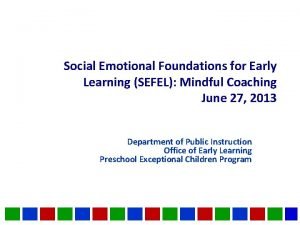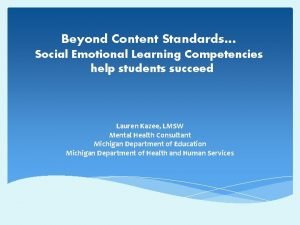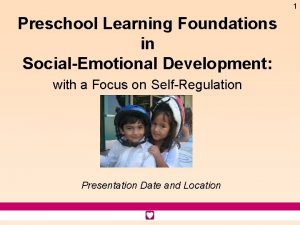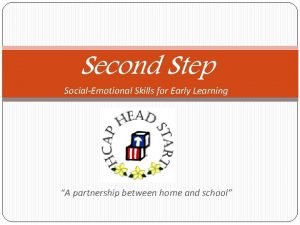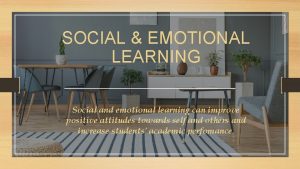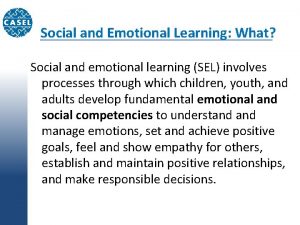What is Social Emotional Learning Social and emotional




- Slides: 4

What is Social Emotional Learning? • "Social and emotional learning (SEL) is the process through which children and adults understand manage emotions, set and achieve positive goals, feel and show empathy for others, establish and maintain positive relationships, and make responsible decisions. " -The Collaborative for Academic, Social, and Emotional Learning (CASEL) • According to PBIS Rewards, SEL initiatives in the classroom result in: • Greater academic success • Fewer behavioral issues • Less emotional distress • Positive social behavior • Stronger teacher-student relationships • Improved career readiness • Positive school climate

The Case for SEL in Schools • In 2011, Joseph Durlak conducted the largest and most well-known study regarding the impact of social-emotional learning. • It showed that students participating in universal SEL programs demonstrated more enhanced social-emotional skills and positive social behavior—as well as lower levels of emotional distress and conduct problems. Students participating in these universal SEL programs also showed gains in academic achievement. • The study also showed that students in Kindergarten through Second Grades showed improvements in prosocial and social-emotional skills, such as emotion management and problem solving, especially those children who started the year with lower skill levels compared to their peers.

What Does SEL Look Like at JPES? • Teachers and assistants have received initial trainings in the background and implementation of SEL. More training will be offered. • Teachers integrate fundamental SEL components daily --- Wellness Checks, Morning Meetings, Brain Breaks, Conscious Closures. • Each student receives two SEL lessons a month via Suite 360, a new district purchased program.

How Parents Can Support SEL • Praise effort instead of ability. • Working hard and persisting through a tough assignment or test deserves loving recognition —even if the grade isn’t great. • Let them make more decisions. • • Ask the right questions. • Show children how to build relationships and communicate better by listening more. Try to lecture less and ask more questions. • Teach problem-solving strategies. • • Give back. • Intentionally looking at the world is a great way to build perspective and empathy. Encourage your child to help others in need or support valuable causes. Children can’t make wise decisions if they never have the chance to practice and they won’t learn to choose wisely if they don’t experience the consequences of failing to do so. Leave lower-consequences choices in their hands Making responsible decisions means choosing constructive solutions in the face of a challenge. Help your child break down big problems into smaller units. • Engage in more family activities. • Playing board or card games is a great way to get children talking. Inviting them to help with routine physical tasks also fosters cooperation and teamwork.
